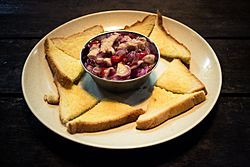Hinava facts for kids

A swordfish hinava served with sandwich bread.
|
|
| Type | Dish |
|---|---|
| Place of origin | Malaysia |
| Region or state | Sabah |
| Created by | Kadazan-Dusun |
| Main ingredients | Fish, lime juice, bird's eye chili, red onion, salt |
| Variations | Hinava ginapan, hinava tongii |
Hinava is a special traditional dish from the Kadazan-Dusun people in Sabah, a state in Malaysia. It is a unique type of salad made mostly from fresh fish. What makes hinava special is that the fish is not cooked with heat. Instead, it is "cooked" using the sour juice of limes. This process is similar to how ceviche is made in other parts of the world.
Contents
Hinava is a popular dish among the Kadazan-Dusun community. It is often served during special events and celebrations, like the Kaamatan Festival, which is a harvest festival. The dish is known for its fresh and tangy taste.
To make hinava, fresh fish is cut into small pieces. The most common fish used is mackerel, but other types like swordfish can also be used. The fish pieces are then mixed with several ingredients that give the dish its unique flavor.
Key Ingredients
The main ingredients in hinava are:
- Fresh Fish: Usually mackerel or swordfish, cut into small cubes.
- Lime Juice: This is the most important ingredient. The acid in the lime juice "cooks" the fish, changing its texture and making it safe to eat without heat.
- Bird's Eye Chili: These small, spicy peppers add a kick to the dish.
- Sliced Shallots: These are a type of onion that adds a mild, sweet, and sharp flavor.
- Grated Ginger: Ginger gives a warm, spicy, and fresh taste.
- Salt: Used to season the dish.
Sometimes, other ingredients like bitter gourd or a type of wild mango called bambangan are added for extra flavor and texture.
While hinava is generally made with fish, there are some variations. The Kadazan people are especially known for their Hinava tongii. Tongii refers to a specific type of fish, often a mackerel, that is commonly used in their version of the dish. Another variation is Hinava ginapan, which might use different types of fish or slightly varied ingredients.
Hinava is more than just a meal; it is a significant part of the Kadazan-Dusun culture. It represents their traditional way of preparing food and their connection to the land and sea. Sharing hinava is a way of celebrating and showing hospitality. It is a dish that has been passed down through many generations, keeping the traditions alive.
 | Jessica Watkins |
 | Robert Henry Lawrence Jr. |
 | Mae Jemison |
 | Sian Proctor |
 | Guion Bluford |

